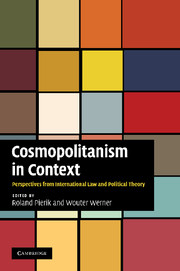Book contents
- Frontmatter
- Contents
- 1 Cosmopolitanism in context: an introduction
- Part I Environmental protection
- Part II World Trade Organization
- Part III Collective security and intervention
- Part IV International Criminal Court
- Part V International migration
- 10 Is immigration a human right?
- 11 A distributive approach to migration law: or the convergence of communitarianism, libertarianism, and the status quo
- Part VI Conclusion
- Index
- References
10 - Is immigration a human right?
Published online by Cambridge University Press: 06 December 2010
- Frontmatter
- Contents
- 1 Cosmopolitanism in context: an introduction
- Part I Environmental protection
- Part II World Trade Organization
- Part III Collective security and intervention
- Part IV International Criminal Court
- Part V International migration
- 10 Is immigration a human right?
- 11 A distributive approach to migration law: or the convergence of communitarianism, libertarianism, and the status quo
- Part VI Conclusion
- Index
- References
Summary
In recent decades the process of globalization has involved the migration of substantial numbers of people from developing to developed countries and between developing countries. This global development has prompted politicians, civil activists, legal scholars, political philosophers, and others to grapple with issues related to immigration. A view that has emerged from some writers who uphold cosmopolitan ideals is that immigration should be regarded as a human right. My primary purpose in this chapter is to examine from a normative standpoint the claim that immigration, understood as involving eventual full integration into countries of destination, should be regarded as a human right. Even though I will argue that one cannot reasonably claim that immigration is a human right, the moral concerns that motivate this claim should be taken seriously. I therefore propose some moral principles to guide the formulation of just immigration policies that take these moral concerns into account. In arguing that immigration should not be regarded as a human right, I contend that there is a fundamental tension between the cosmopolitan claim that we should show equal moral concern for everyone and the institutionalization of that claim in immigration policies that allow individuals to move freely across national borders.
In the first part of this chapter, I examine what is involved in claiming that immigration is a human right. I discuss the nature and scope of this right and identify the right-bearers and those on whom the right can be claimed.
- Type
- Chapter
- Information
- Cosmopolitanism in ContextPerspectives from International Law and Political Theory, pp. 221 - 248Publisher: Cambridge University PressPrint publication year: 2010
References
- 5
- Cited by



